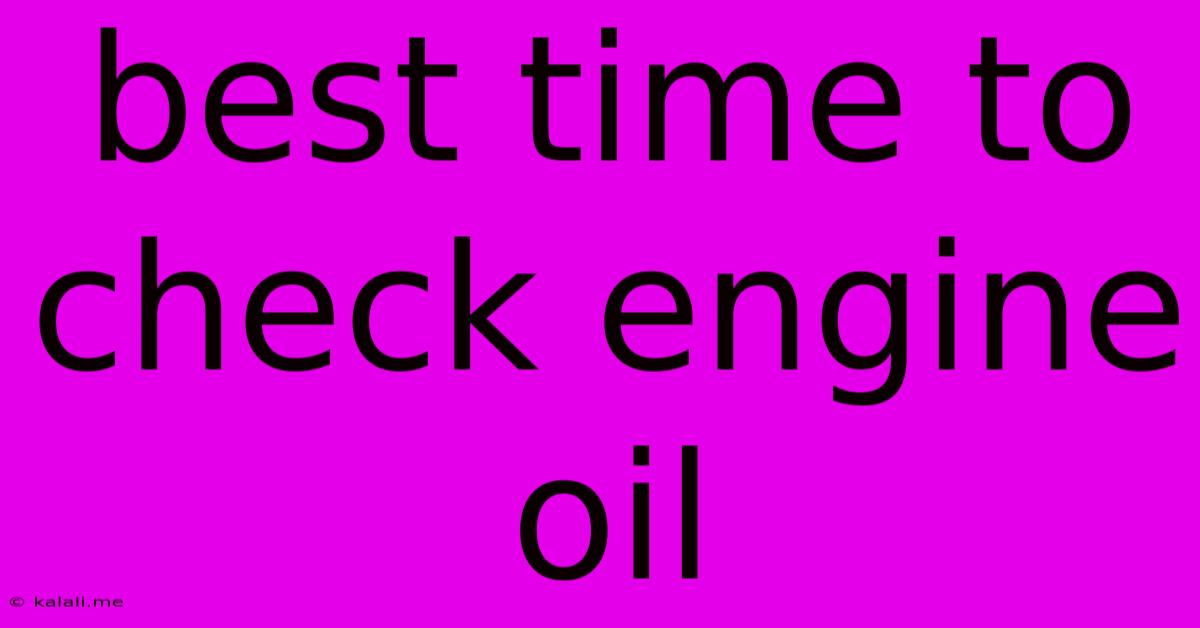Best Time To Check Engine Oil
Kalali
May 21, 2025 · 3 min read

Table of Contents
The Best Time to Check Your Engine Oil: A Comprehensive Guide
Checking your engine oil regularly is crucial for maintaining your vehicle's health and preventing costly repairs. But knowing when to check it is just as important as knowing how. This guide will delve into the optimal times to check your engine oil, ensuring you're always a step ahead in preventative car maintenance. Ignoring this simple task can lead to engine damage, so let's get started.
Why Timing Matters When Checking Engine Oil
The accuracy of your oil level reading depends heavily on the engine's temperature and recent operation. Checking at the wrong time can lead to inaccurate readings, potentially causing you to add too much or too little oil. Both scenarios are detrimental to your engine's health. Therefore, understanding the ideal conditions is vital.
The Optimal Time: After the Engine Cools Down
The best time to check your engine oil is after the engine has been turned off and allowed to cool down for at least 10-15 minutes. This allows the oil to fully drain back into the oil pan, providing a more accurate reading of the oil level. Checking immediately after driving, when the oil is still hot, will give you a falsely low reading because the oil is still circulating throughout the engine.
Why a Cold Engine is Not Ideal
While a completely cold engine might seem like the perfect time, it's actually less accurate. The oil is thicker when cold, and some might still remain in the engine's upper components, leading to an inaccurate low reading. Therefore, waiting for a slightly cooled engine provides a more reliable measurement.
Other Important Considerations
-
Consistency is Key: Establish a regular schedule. Whether it's weekly, bi-weekly, or monthly, consistent checks are crucial. Refer to your owner's manual for specific recommendations based on your vehicle's make and model.
-
Level Surface: Ensure your vehicle is parked on a level surface. An uneven surface can skew the oil level reading.
-
Clean Dipstick: Before checking, clean the dipstick thoroughly with a clean rag. This removes any residue that could interfere with an accurate reading.
-
Interpreting the Reading: Most dipsticks have markings indicating the minimum and maximum oil levels. The level should ideally be between these two marks.
-
Note Oil Condition: While checking the level, also take a moment to observe the oil's condition. Is it dark and sludgy, or relatively clean and clear? Dark, dirty oil is a sign it's time for an oil change.
-
Consult Your Owner's Manual: Your owner's manual will provide specific instructions and recommendations for checking and maintaining your vehicle's oil levels.
Avoiding Common Mistakes
- Checking while the engine is hot: This leads to inaccurate low readings.
- Ignoring the dipstick: Regular checks are essential for preventative maintenance.
- Using the wrong type of oil: Always use the type and grade of oil recommended by your vehicle's manufacturer.
- Overfilling the oil: Overfilling can damage your engine.
By following these simple guidelines and understanding the optimal time to check your engine oil, you can contribute significantly to the longevity and performance of your vehicle. Remember, preventative maintenance is always cheaper than repair!
Latest Posts
Latest Posts
-
Cameron Coleman Home Lander Floater In Bathroom Scene
May 23, 2025
-
I Was Told I Am Giving Adhan Wrong
May 23, 2025
-
What Does 2nf Mean On Multimeter When Measure Capacitance
May 23, 2025
-
Udpate Date Time To Blank In Salesofrce Flow
May 23, 2025
-
Fourier Transform Of Radially Symmetric Function In 2d
May 23, 2025
Related Post
Thank you for visiting our website which covers about Best Time To Check Engine Oil . We hope the information provided has been useful to you. Feel free to contact us if you have any questions or need further assistance. See you next time and don't miss to bookmark.